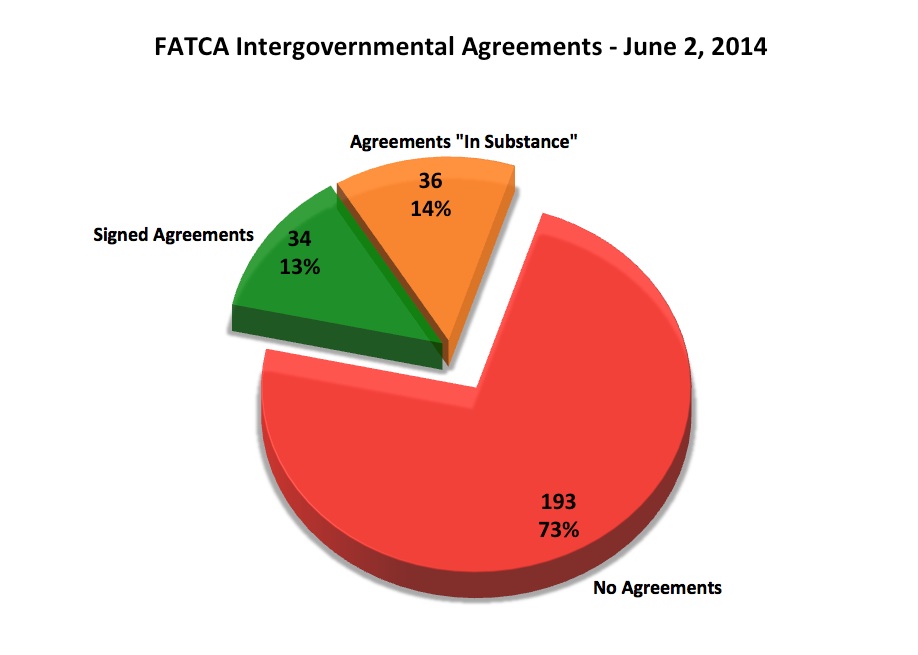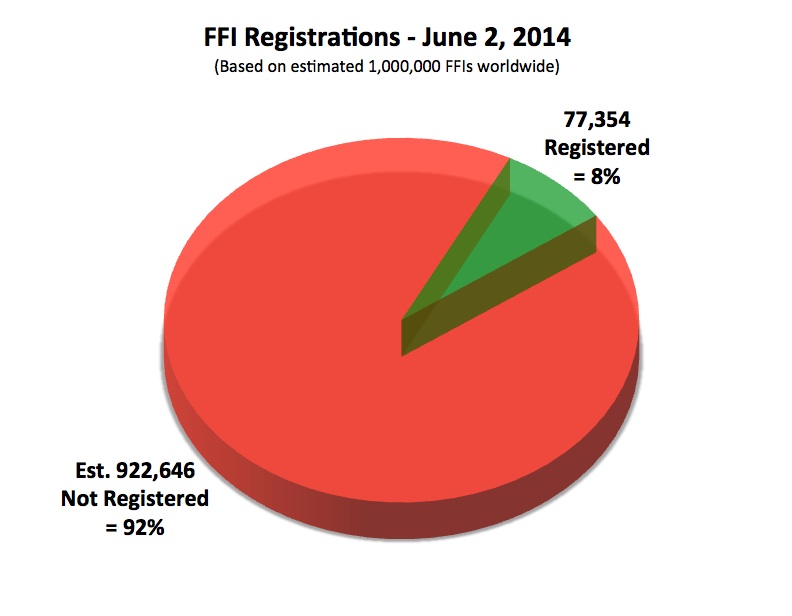 As most of us will recall from our school days, an iceberg is a deeply deceptive thing since 90% of its mass lies hidden beneath the waves. Like an iceberg, the full reality of FATCA remains largely hidden from view, even now, a mere 20 days before its implementation.
As most of us will recall from our school days, an iceberg is a deeply deceptive thing since 90% of its mass lies hidden beneath the waves. Like an iceberg, the full reality of FATCA remains largely hidden from view, even now, a mere 20 days before its implementation.
Much attention has been paid to FATCA’s most visible aspects – the growing numbers of both signed and “in substance” agreements – as well as the more than 77,000 FFIs which have entered the Portal of Mordor and received their shiny new IRS deputy badges. As Robert Stack, deputy assistant treasury secretary for international tax affairs crowed, “The strong international support for FATCA is clear, and this success will help us in our goal of stopping tax evasion and narrowing the tax gap.”
But appearances are indeed deceiving with FATCA, and the imminent danger lies not so much with what is already seen, but that which remains to be seen, still lurking in the shadows beneath the surface.
The IRS itself recently realized that progress was going painfully slowly on officially signing-up the 263 tax jurisdictions which it recognizes (196 Independent States in the World and 67 Dependencies and Areas of Special Sovereignty) to its list of IGAs. It therefore decided to lump together all the full-terms (signed agreements) with the preemies (“in substance” agreements) to suddenly come up with a combined list of 70 more-or-less IGAs. Well, here’s what that actually looks like:
Conversely, here is the current list of jurisdictions which have no FATCA agreement of any kind (with some notable entries highlighted in bold):
Afghanistan
Akrotiri
Albania
Algeria
Andorra
Angola
Anguilla
Antarctica
Antigua and Barbuda
Argentina
Aruba
Ashmore and Cartier Islands
Bahrain
Baker Island
Bangladesh
Belarus
Belize
Benin
Bhutan
Bolivia
Bosnia and Herzegovina
Botswana
Bouvet Island
British Indian Ocean Territory
Brunei
Burkina Faso
Burma
Burundi
Cabo Verde
Cambodia
Cameroon
Central African Republic
Chad
China
Christmas Island
Clipperton Island
Cocos (Keeling) Islands
Comoros
Congo (Brazzaville)
Congo (Kinshasa)
Cook Islands
Coral Sea Islands
Côte d’Ivoire
Cuba
Dhekelia
Djibouti
Dominica
Dominican Republic
Ecuador
Egypt
El Salvador
Equatorial Guinea
Eritrea
Ethiopia
Falkland Islands (Islas Malvinas)
Faroe Islands
Fiji
French Guiana
French Polynesia
French Southern and Antarctic Lands
Gabon
Gambia, The
Georgia
Ghana
Greece
Greenland
Grenada
Guadeloupe
Guatemala
Guinea
Guinea-Bissau
Guyana
Haiti
Heard Island and McDonald Islands
Holy See
Howland Island
Iceland
Iran
Iraq
Jan Mayen
Jarvis Island
Johnston Atoll
Jordan
Kazakhstan
Kenya
Kingman Reef
Kiribati
Korea, North
Kyrgyzstan
Laos
Lebanon
Lesotho
Liberia
Libya
Macau
Macedonia
Madagascar
Malawi
Malaysia
Maldives
Mali
Marshall Islands
Martinique
Mauritania
Mayotte
Micronesia, Federated States of
Midway Islands
Moldova
Monaco
Mongolia
Montenegro
Montserrat
Morocco
Mozambique
Namibia
Nauru
Navassa Island
Nepal
New Caledonia
Nicaragua
Niger
Nigeria
Niue
Norfolk Island
Oman
Pakistan
Palau
Palmyra Atoll
Papua New Guinea
Paracel Islands
Paraguay
Philippines
Pitcairn Islands
Reunion
Russia
Rwanda
Saint Barthelemy
Saint Helena
Saint Kitts and Nevis
Saint Lucia
Saint Martin
Saint Pierre and Miquelon
Saint Vincent and the Grenadines
Samoa
San Marino
Sao Tome and Principe
Saudi Arabia
Senegal
Serbia
Sierra Leone
Sint Maarten
Solomon Islands
Somalia
South Georgia and the South Sandwich Islands
South Sudan
Spratly Islands
Sri Lanka
Sudan
Suriname
Svalbard
Swaziland
Syria
Tajikistan
Tanzania
Thailand
Timor-Leste
Togo
Tokelau
Tonga
Trinidad and Tobago
Tunisia
Tuvalu
Uganda
Ukraine
Uruguay
Uzbekistan
Vanuatu
Venezuela
Vietnam
Wake Island
Wallis and Futuna
Western Sahara
Yemen
Zambia
Zimbabwe
Meanwhile, the number of FFIs which have registered with the IRS currently stands at 77,354. The total number of FFIs worldwide (all financial institutions outside of the U.S.) is unknown, but estimates have ranged from several hundred thousand to the low millions. A common estimate has been one-million, which looks like this:
As you can see from both charts, the red areas represent large zones of uncertainty and danger in the imminent rollout of FATCA. The language is quite clear in the IRS documentation: 30% withholding will begin on July 1st for FFIs which are not deemed to be FATCA compliant. Because of pass-through payments and the desire to avoid all possible risks associated with FATCA regulations, there is every reason to believe that FATCA-compliant financial institutions will immediately begin large-scale withholding on transactions with thousands of non-compliant FFIs from hundreds of jurisdictions with no IGAs in place.
It is also becoming clear that the nations and territories which will bear the full brunt of FATCA withholding are amongst the poorest and least-prepared in the entire world, especially Africa. FATCA will crack open both historic and brand-new fault lines between rich and poor nations everywhere. Read the list again, and extrapolate our very near future.
Like an iceberg, FATCA’s greatest danger lies well beneath the surface; unseen, and patiently awaiting its moment of destiny. July 1st will most surely go down in the history books as a day of tragic infamy and the beginning of a calamity whose outlines we have only begun to discern through dark and troubled waters.
Additional references:
The FATCA GIIN list analyzed by IGA and by countries







it would be useful if we all kept a running tab on those banks that explicitly do not deal in US dollars….
Well you can cross Egypt off the list. One of your bold ones as well.
It’s game over if china signs.
@Deckard1138, Excellent post! Thanks for sharing those pie charts, and your analysis with everyone. It’s interesting that Allison Christians came up with something similar around the same time – great minds think alike I guess.
That’s strange. The news says 90% of Egypt banks have signed up for FATCA and something called Egypt Post.
http://www.zawya.com/story/Egypt_Post_signs_US_FATCA_Tax_Deal-ZAWYA20140615051712/
National Postal Authority. I wonder if that’s like National Savings and Investment in the UK that was probably original part of the GPO.
There are several institutions in several countries that will open accounts (bank and brokerage) entirely through the mail, even for Americans. These institutions are financially solid and in countries exercising sound monetary practices. All are non FATCA participants, and none have any US locations, placing them entirely out of US jurisdiction. See for yourself: swisssolution.webs.com
@Gman
Countries are having banks track where the money goes. The U.S. cracked down on Israel partly because it found out that the Swiss money was moved there. Some of the Israeli money went to Dubai, and the Israelis now are taking notice. If you move an account from somewhere like Switzerland to a non-signatory like Belize or Monaco, you can’t even plead that this was some long-forgotten account or that you didn’t know what you were doing.
The options, however, even the legitimate ones, are getting really limited. Today I received a letter from Fidelity Investments US, where I have a small Roth Individual Retirement Account left over from when I lived in the U.S. and worked there. Although the UK government doesn’t like its residents owning foreign mutual funds,it is o.k. with IRAs because they are pensions There is nothing fishy about my owning this. I had planned to cash out once I was old enough to do so without penalty anyway.
According to this letter, due to my residing outside the U.S., I will neither be able to buy more funds nor exchange out of the fund I have after 1 August. Now, I file married separately due to the foreign spouse and earn well above $10,000, so contributing more has never been on the cards. It still rankles since IRAs are supposed to be an available option for U.S. taxpayers overseas, since we are all going to move back to the motherland in our dotage in their fantasies (or should that be their nightmares?). Anyway, keep your eyes out for irate Fidelity customers!
Also see: http://isaacbrocksociety.ca/2012/07/22/fidelity-investments-refuses-to-service-to-u-s-persons-abroad/
@Publius
Just the tip of another iceberg. We’ve focussed a lot on the big banks, but I believe it’s the investment houses and life insurance companies that are going to create the most grief for many expats since they traditionally manage the primary nest-eggs.
@Publius,
I guess the advice to Americans moving abroad is to change the address they have on file at US banking institutions to some relatives living in the US.
When I left my country of origin as a student, then got a job in the US, I always kept my address on file for my small bank account in my country of origin bank at my parents, where it’s always been, since they opened it when I was a kid.
You can keep doing online banking. Don’t most people do that? Why would you change your address to a foreign address? Looks like it’s asking for trouble.
http://haydonperryman.wordpress.com/2014/06/15/further-analysis-of-77353-registrants-on-the-irs-list-of-june-2nd-2014/
IMPORTANT
Only 5841 FFI’s are relevant:
“Regarding the IRS List published June 2nd 2014
22 are registered in a country called “Other”
13,425 appear to be Participating FFIs i.e. they have what appear to have a valid GIIN and are in a IGA Model 2* jurisdiction.
57,425 appear to be Registered Deemed Compliant FFIs i.e. they appear to have a valid GIIN and are in a IGA Model 1* jurisdiction.
54 have a GIIN that does not match their country
5,841 are from jurisdictions that have no IGA* at the time of writing
586 are in the US or US territories
Some 92% of those registered on this list are in IGA* countries. One could reasonably conclude that registration may have a close correlation to the jurisdiction having an IGA.”